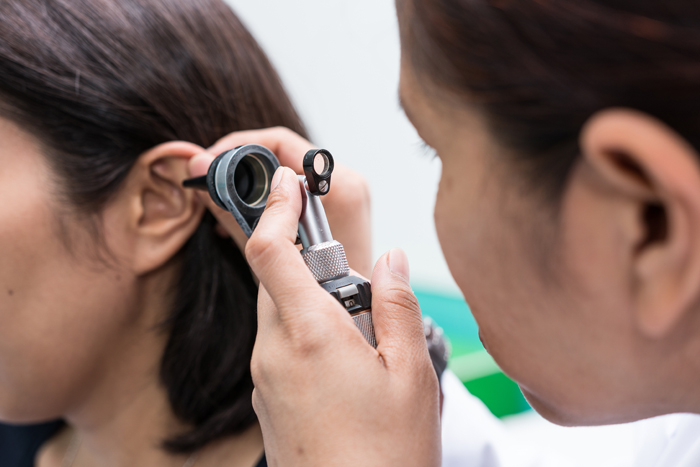Ear Infection Treatment in Alwarpet, Chennai
The middle ear is the air-filled space behind your eardrum containing tiny vibrating bones of the ear. Infection of the middle ear due to bacteria or virus is called an ear infection or acute otitis media.

What do you need to know about ear infection?
Children are more prone to ear infections than adults. Usually, ear infections get cured on their own, but if not, then you must consult an ENT specialist to take antibiotics. Ear infections can result in hearing problems due to the building up of fluid behind the eardrum.
To seek treatment, you can consult an ENT specialist near you or visit an ENT hospital near you.
What are the types of ear infection?
Ear infection can be of many types depending upon the reason for the same:
- Acute otitis media – This occurs as a result of bacterial or viral infection that traps the fluid behind the eardrum causing pain and swelling of the eardrum.
- Otitis media with effusion – This follows acute otitis media in which there is no active infection but the fluid remains.
- Chronic suppurative otitis media – This condition can result in the formation of a hole in the eardrum and doesn’t get treated.
What are the symptoms?
There are many signs and symptoms associated with an ear infection:
- Pain in ear
- Loss of appetite
- High fever and headache
- Loss of balance, and trouble sleeping
- Drainage of fluid from the ear due to rupture of the eardrum
- Trouble in hearing
What causes ear infection?
- Infection of the lining of the inner ear
- Children between the age of 6 months and 2 years are susceptible to ear infection
- Children drinking from a bottle while lying down
- Change in seasons
- Poor quality of air
- Cleft palate makes it difficult for the Eustachian tube to drain
- Allergies and inflammation of nasal passage and upper respiratory tract
- Chronic respiratory diseases like cystic fibrosis and asthma
When do you need to see a doctor?
If you observe the signs and symptoms mentioned above for more than a day, and the pain in the ear is severe, then you must consult ENT specialists near you. Along with these, if you observe discharge of fluid, pus or bloody fluid from the ear or irritation in the upper respiratory tract, then visit an ENT specialist in Chennai.
Request an appointment at Apollo Spectra Hospitals, Alwarpet,Chennai.
Call 1860 500 2244 to book an appointment.
What are the risk factors?
Usually, ear infections don’t cause long-term effects but still, there are many risks associated with it like:
- Loss of hearing
- Delayed speech and language development in children
- Rupture of the eardrum
- Infection in mastoid bone in the skull – mastoiditis
- Bacterial infection in the membrane covering the brain and spinal cord
How is ear infection prevented?
You must have heard that prevention is better than cure. There are many ways to prevent ear infection:
- Wash hands frequently to avoid the spread of bacterial and viral infections
- Reduce the exposure of children to cold and allergic reactions
- No one in the house should smoke to avoid second-hand smoking
- Baby must be breastfed for 6-12 months so that the child gets antibodies from breast milk
- During bottle feeding, the baby must be held in an upright position
- Get vaccinated for influenza, pneumococcal, meningitis, etc.
- To prevent snoring and breathing with the mouth, adenoids must be removed by adenoidectomy.
How is ear infection treated?
The type of treatment depends upon the age, severity and nature of the infection. Treatments available include:
- Antibiotics – If a bacterial infection is responsible for ear infection, then antibiotics are prescribed according to the age and severity of infection in people.
- Antibiotic ear drops and suction devices to remove the fluids are useful to treat a rupture in the eardrum as a result of infection.
- Pain-relieving medicines like acetaminophen and ibuprofen are prescribed.
- Ear tubes or tympanostomy tubes are used to treat chronic ear infections by draining out the fluid from the middle ear. This is done with a surgical procedure termed myringotomy.
Conclusion
An ear infection is usually a short-term infection generally diagnosed in children. When it becomes a long-term illness, it can result in loss of hearing and inflammation. It is important to consult an ENT specialist near you for the right treatment.
In many patients, an ear infection can last for only 2-3 days, but in a critical condition, it may last for 6 weeks or longer.
If the ear infection lasts for 10-14 days, fever is high and doesn’t reduce easily, then the ear infection has been caused by a virus.
If you have a mild ear infection, then you can apply a warm cloth or warm water bottle to the affected part of the ear to reduce the pain.
While suffering from an ear infection, you must sleep with two pillows so that the affected ear is at a higher level than the rest of your body.
Symptoms
Our Doctors
DR. DEEPIKA JEROME
BDS...
| Experience | : | 14 Yeras Experience |
|---|---|---|
| Speciality | : | Dental and Maxillofa... | Location | : | MRC Nagar |
| Timings | : | Mon - Sat : 9:30 AM ... |
DR. PRABHA KARTHIK
MBBS, DNB...
| Experience | : | 7 Yeras Experience |
|---|---|---|
| Speciality | : | ENT, Head and Neck S... | Location | : | Alwarpet |
| Timings | : | Mon - Fri - 12:30p... |
DR. SUNDHARI V
MBBS, DNB...
| Experience | : | 27 Yeras Experience |
|---|---|---|
| Speciality | : | ENT, Head and Neck S... | Location | : | Alwarpet |
| Timings | : | Mon - Sat : 10:00 AM... |
DR. ELANKUMARAN K
MBBS, MS (General Su...
| Experience | : | 20 Yeras Experience |
|---|---|---|
| Speciality | : | General Surgery & Ga... | Location | : | Alwarpet |
| Timings | : | Available by prior a... |
DR. SATHYA NARAYANAN
MBBS, MS (ENT)...
| Experience | : | 4 Yeras Experience |
|---|---|---|
| Speciality | : | ENT, Head and Neck S... | Location | : | Alwarpet |
| Timings | : | Mon - Sun : 2:00 PM ... |
DR. M BARATH KUMAR
MBBS, MD (INT.MED), ...
| Experience | : | 12 Yeras Experience |
|---|---|---|
| Speciality | : | General Surgery & Ga... | Location | : | Alwarpet |
| Timings | : | Wed : 3:30 PM to 4:3... |
DR. ANAND L
MS, MCh (GASTRO), FR...
| Experience | : | 21 Yeras Experience |
|---|---|---|
| Speciality | : | General Surgery & Ga... | Location | : | MRC Nagar |
| Timings | : | Mon - Sat : 8:00 PM ... |
DR. KARTHIC BABU NATARAJAN
MBBS,MD, DNB...
| Experience | : | 13 Yeras Experience |
|---|---|---|
| Speciality | : | Pain Management... | Location | : | MRC Nagar |
| Timings | : | On Call... |
DR. MURALEEDHARAN
MBBS,MS (ENT), DLO...
| Experience | : | 34 Yeras Experience |
|---|---|---|
| Speciality | : | ENT, Head and Neck S... | Location | : | MRC Nagar |
| Timings | : | Mon - Sat : 4:30 PM ... |
DR. SHEERIN SARAH LYSANDER
MBBS, MD(Anesthesiol...
| Experience | : | 8 Yeras Experience |
|---|---|---|
| Speciality | : | Pain Management... | Location | : | MRC Nagar |
| Timings | : | Mon - Sun : 7:00 AM ... |
DR. ADITYA SHAH
MBBS, MD, DM (Gastro...
| Experience | : | 6 Yeras Experience |
|---|---|---|
| Speciality | : | General Surgery & Ga... | Location | : | Alwarpet |
| Timings | : | Mon - Fri : 5:00 PM ... |
DR. KAVYA M S
MBBS, MS (ENT)...
| Experience | : | 13 Yeras Experience |
|---|---|---|
| Speciality | : | ENT, Head and Neck S... | Location | : | Alwarpet |
| Timings | : | Available on prior a... |
DR. RAJASEKAR M.K.
MBBS,DLO.,MS(ENT)...
| Experience | : | 30 Yeras Experience |
|---|---|---|
| Speciality | : | ENT, Head and Neck S... | Location | : | Alwarpet |
| Timings | : | Mon, Wed, Fri - 6:... |
DR. NIRAJ JOSHI
MBBS, Ph.D, DLO, FAG...
| Experience | : | 8 Yeras Experience |
|---|---|---|
| Speciality | : | ENT, Head and Neck S... | Location | : | Alwarpet |
| Timings | : | Mon - Sat - 6:00pm -... |
DR. ADITYA SHAH
MBBS, MD, DM (Gastro...
| Experience | : | 5 Yeras Experience |
|---|---|---|
| Speciality | : | General Surgery & Ga... | Location | : | MRC Nagar |
| Timings | : | Mon - Sat : 6:00 PM ... |
DR. SUNNY K MEHERA
MBBS, MS - OTORHINOL...
| Experience | : | 8 Yeras Experience |
|---|---|---|
| Speciality | : | ENT, Head and Neck S... | Location | : | MRC Nagar |
| Timings | : | Mon - Sat : 2:00 PM ... |
DR. ULAGESWARI R
MBBS, MS ENT, Head a...
| Experience | : | 8 Yeras Experience |
|---|---|---|
| Speciality | : | ENT, Head and Neck S... | Location | : | MRC Nagar |
| Timings | : | Mon to Sat : 9:00 AM... |
DR. V.J. NIRANJANA BHARATHI
MBBS, MS (ENT)...
| Experience | : | 9 Yeras Experience |
|---|---|---|
| Speciality | : | ENT, Head and Neck S... | Location | : | MRC Nagar |
| Timings | : | Mon - Sat : 10:00 AM... |
Our Top Specialities
NOTICE BOARD
CONTACT US
CONTACT US
 Book Appointment
Book Appointment




















.svg)
.svg)
.svg)
.svg)








